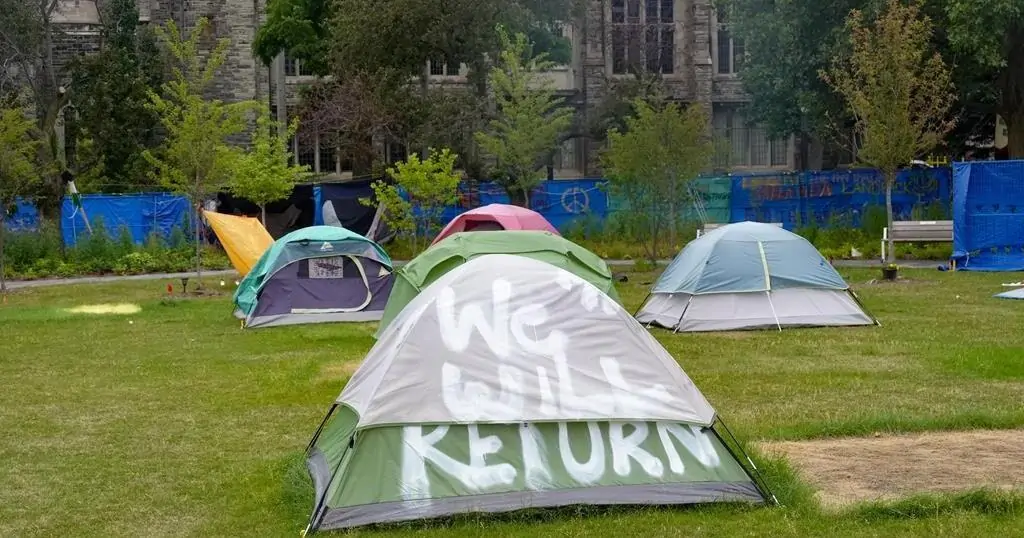TORONTO – Only three tents remain at a pro-Palestinian protest at the University of Toronto as demonstrators dismantle their encampment ahead of a 6 p.m. deadline to leave the site.
An Ontario judge issued an order Tuesday for the protesters to take down the encampment that was set up at King’s College Circle two months ago and at one point included as many as 177 tents.
Despite moves to disassemble the camp, demonstrators have vowed to continue their activism.
A crowd is gathering near the site for a rally in support of the protesters.
The injunction authorized police to step in if demonstrators don’t leave the site by 6 p.m.. Police have said they would enforce the order but would not disclose any operational plans.
Toronto police officers were seen posting the court order on the encampment fence this morning, as Palestinian flags waved overhead. The force issued a statement around noon urging protesters to leave voluntarily to “ensure a safe outcome for everyone.”
An Irish rebel song echoed from the encampment entrance as demonstrators wheeled out supplies in wagons and yellowed patches of grass dotted the lawn where tents once stood.
In a statement issued around 11 a.m., demonstrators said they had not made a final decision “about the 6 p.m. deadline.”
Ontario Superior Court Justice Markus Koehnen’s decision, issued Tuesday, says while there is no evidence the encampment participants have been violent or antisemitic, the demonstration has taken away the university’s ability to control what happens in King’s College Circle.
Koehnen says property owners generally decide what happens on their property, and if protesters can take that power for themselves, there is nothing to stop a stronger group from coming and taking over the space from the current protesters, leading to chaos.
Ontario’s Minister of Colleges and Universities said post-secondary institutions have an “obligation to protect the safety and well-being of students, faculty and staff so that students can continue to learn without interruption.”
“Like any court order, this order should be followed to ensure that happens,” read the statement from Minister Jill Dunlop.
The protesters set up camp on May 2 and previously said they would stay put until the school agrees to their demands, which include disclosing and divesting from investments in companies profiting from Israel’s offensive in Gaza.
The court ruling said the university has procedures in place to consider divestment requests and has offered the protesters an expedited process.
Protesters, however, have said they have no confidence in the process, since it rests on recommendations to the university president that he can either follow or ignore. They note Meric Gertlerdeclined to follow a 2016 recommendation to divest from fossil fuels, only to initiate his own process years later that may result in divestment by 2030 — 16 years after the request was made.
“The protesters submit that Gaza does not have 16 years to wait,” Tuesday’s court decision read.
The university initially sought an urgent injunction against the encampment in late May because it’s near Convocation Hall, where graduation ceremonies were scheduled to take place over several weeks in June. The court ended up hearing arguments over two days last month, after most ceremonies were almost done.
No major disruptions were reported.
The judge issued his decision Tuesday, which ruled that, “as passionate as the protesters may be,” they had no unilateral right to decide how the campus green space can be used by their exercise of “force, occupation or intimidation.”
“If the property truly is a quasi-public space, why should one ad hoc group of people get to determine who can use that space for a period of over 50 days?
“As passionate as we may be about alleviating human suffering around the world, depriving our fellow residents of green space accomplishes nothing,” the judge wrote.
The ruling, however, dismissed allegations that the encampment demonstrators had trafficked in antisemitic hate speech and slogans, accusations routinely directed at the group by pro-Israeli organizations who had sought to undermine the protest.
While the judge noted some speech of the “exterior of the encampment” rose to the level of hate speech, none of the encampment demonstrators had been linked to those statements and they had, in fact, taken steps to take down offensive messages near the camp when they appeared.
The judge, on the other hand, cited several examples of the demonstrators themselves being subject to hateful commentary.
He concluded that the encampment was peaceful and cited testimony from demonstrators who described it as an inclusive, caring community where Muslim and Jewish people had co-led Shabbat dinners and shared in prayer.
Protesters, the decision notes, argued criticism of Israel had been conflated with antisemitism, fuelling a moral panic around the issue that had crossed into a new form of repression against those who support Palestinian rights.
“The respondents’ fears about the risk of a new form of McCarthyism are not without foundation,” the judge wrote, referring to the political repression campaign in the 1940s and 1950s to spread fear about alleged communist influence in the U.S. government.
Protesters argued an injunction would be a major infringement on their free expression rights, and underscored universities as a key forum for protest and debate. The judge, however, found there was no right to occupy property that does not belong to them, “no matter how much more effective their protest would be if they were able to do so.”
The university, the judge wrote, has said protesters continue to have the right to protest anywhere on campus, but just can’t set up camps and block entry to university property.
This report by The Canadian Press was first published July 3, 2024.

























